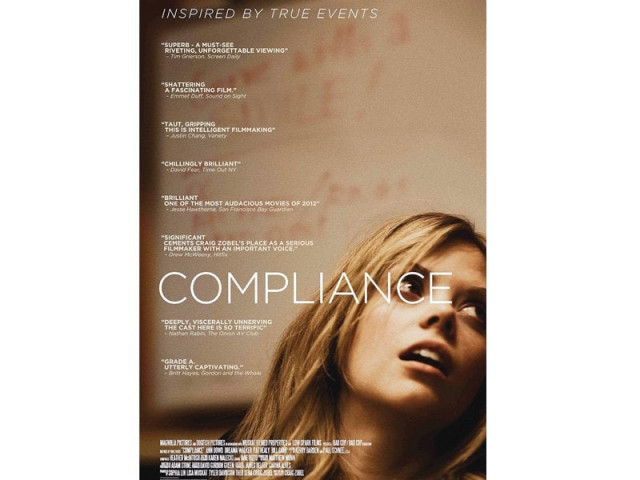Movie review: Compliance - cog in the machine
Discomfort comes from claustrophobic atmosphere as action takes place in one setting, at slow pace.

Compliance teaches us that our normally sound instinct to trust authority figures can work against us.
Much of the discomfort comes from the claustrophobic atmosphere as the action takes place in one setting, at a slow pace, with very few scene changes. The opening scene is at a fast food restaurant staffed by teenagers and managed by a woman who is stern but fair. The whole episode is a flashback to Milgram’s experiment on obedience, and the title of the movie seems to be a nod to that. Worse, it’s based on true events, with little narrative deviation from the actual crimes.
At the humdrum ChickWich restaurant, the local manager Sandra (Ann Dowd) receives a call from a police officer accusing one of the employees, Becky, of stealing money from a customer’s purse. While the police officer is busy searching Becky’s home, he instructs Sandra to call her to the office. Sandra summons young Becky (Dreama Walker), who is under the illusion that this is about a previous freezer accident at the restaurant, and lo and behold, she fits the description of a thief. Sandra seems to have a hard time fathoming how Becky could have done it. Still, she carries on with her apparent civic duty to comply.
Officer Daniels (Pat Healy) demands that the manager keep the young employee in her sight at all times. He presumes guilt without formal charges, and gives orders that violate Becky’s privacy. Gradually, he moves from being stubborn to verbally abuse and perverse. One is left wondering whether the real issue at hand here is the pathology of power.
Soon, things don’t seem to add up. Standard police protocol isn’t being followed, and we are left wondering whether the cop has some ulterior motive because Becky seems innocent and there’s no proof against her.
What is most disturbing about the movie is that it shows how our normally sound instinct to trust authority figures can work against us. It’s not just that a girl is victimized, but that good people with fair intentions can let this happen. It speaks volumes about our human condition and about the relativity of morality. It raises self-awareness in the viewer about the price of complicity. The potential lessons learned can, perhaps, redeem the film of its squirminess.
Published in The Express Tribune, Sunday Magazine, March 3rd, 2013.
Like Express Tribune Magazine on Facebook to stay informed and join the conversation.


















COMMENTS
Comments are moderated and generally will be posted if they are on-topic and not abusive.
For more information, please see our Comments FAQ